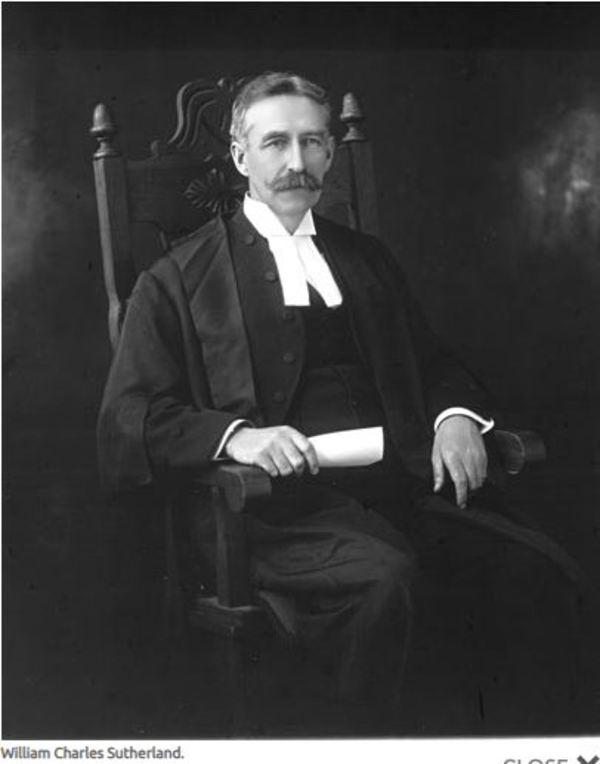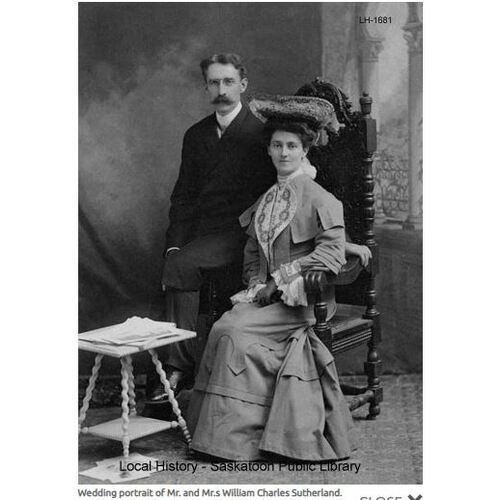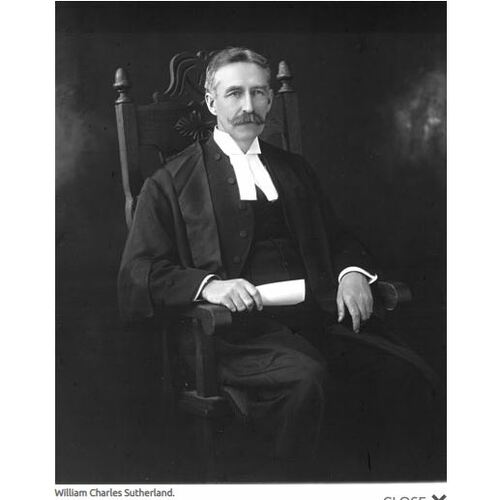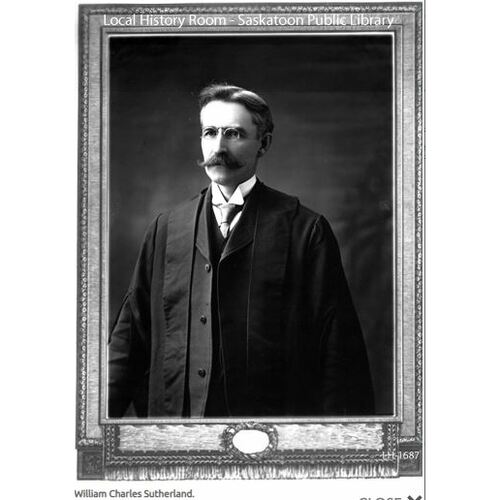
Source: Link
SUTHERLAND, WILLIAM CHARLES, lawyer, farmer, and politician; b. 7 June 1865 in Embro, Upper Canada, son of Thomas Sutherland and Isabella Campbell; m. 28 April 1904 Alice Mary Walker in Shelburne, Ont., and they had two sons and two daughters; d. 2 March 1940 in Saskatoon.
William Sutherland’s parents hailed from Sutherland, Scotland, and after immigrating to Canada they operated a farm near Embro. William was educated at the local common school and the high school in Orangeville before attending Montreal’s McGill University, where he studied in the department of classics and earned a ba with first-rank honours in 1895. Shortly afterwards Sutherland moved to Manitoba, where he planned to pursue a career in law. He was articled to the firm of F. A. Brown in Carman and then to that of William Egerton Perdue and Thomas Robinson in Winnipeg, and was called to the provincial bar in 1899. Four years later, however, he decided to relocate to Saskatoon, a town in the North-West Territories that would become a city in 1906 [see James Clinkskill], a year after the creation of the province of Saskatchewan.
Sutherland thrived in Saskatoon, quickly joining the territorial bar and establishing a prosperous legal practice. He also operated a large, highly successful wheat farm near the city and took a great interest in the raising and breeding of livestock. Sutherland earned a sterling reputation for the quality of his Yorkshire hogs, Clydesdale horses, Shorthorn cattle, and Shropshire sheep, and he would serve at various times as president of the Provincial Poultry and Pet Stock Association and the Saskatchewan Sheep Breeders’ Association as well as vice-president of the Provincial Horse Breeders’ Association. A member of the city’s business elite, he was secretary of the Board of Trade, vice-president of the Canadian National Fire Insurance Company, a director of the Saskatoon Fair, and a founder, along with James Frederick Cairns* and others, of the Saskatchewan Power Company.
Sutherland was raised a Presbyterian, and his faith would remain important to him throughout his life. A member of Knox Presbyterian Church, built between 1912 and 1914, he served as an elder from 1913 onwards, remaining there after it was renamed Knox United Church following the formation of the United Church of Canada in 1925 [see Samuel Dwight Chown; Clarence Dunlop Mackinnon]. He was involved in the development of the Presbyterian Theological College from its establishment in 1912 (it would become St Andrew’s College in 1925) and was chairman of its board for many years. In addition, he was engaged in the city’s social life as a freemason and a founder of the Saskatoon Club.
Sutherland was active in local public administration and politics almost from the moment of his arrival in Saskatoon. He was its first secretary-treasurer in 1903 and served as an alderman in 1904 and 1905 before leaving the municipal government to run as a Liberal for the Legislative Assembly of the new province of Saskatchewan. Elected on 13 Dec. 1905 in Saskatoon County, he became a backbencher in the government of Premier Thomas Walter Scott, whose cabinet included William Richard Motherwell*, James Alexander Calder*, and John Henderson Lamont; George Langley would become a member several years later. During the first session Sutherland chaired two standing committees (on private bills and railways and on law amendments and municipal law) and, most notably, was elected deputy speaker of the assembly. Although he occupied an ostensibly non-partisan position, in May 1906 Sutherland introduced a controversial resolution that called on the government to move the provincial capital from Regina to Saskatoon. It was defeated by a vote of 21 to 2 after a lengthy debate. In the election of 14 Aug. 1908 Sutherland won again in Saskatoon County, and his fellow mlas made him speaker, a distinction he would hold throughout the four-year session. He retained his seat in the election of 11 July 1912, but did not serve as speaker in the new session.
In 1917 Sutherland left politics and moved to Galt (Cambridge), Ont., where he lived for the next four years. There he gravitated towards agrarian politics and supported a local candidate for a farmers’ party. He evidently missed his adopted city, for he remained an elder of Knox Presbyterian Church during his absence and returned permanently to Saskatoon in 1921. In the federal election of that year he sought to represent the Progressive Party [see Thomas Wakem Caldwell] in the riding of Saskatoon but was unsuccessful. He died at his home on 2 March 1940 after a long illness. In addition to providing Saskatchewan with “much efficient and well directed service” as speaker of the assembly, according to historian Norman Fergus Black, William Sutherland played a key role in the early histories of Knox United Church and St Andrew’s College; the latter would become part of the University of Saskatchewan and the United Church’s primary location for theological training in the prairie region. Sutherland, a town that was annexed by Saskatoon in 1956 but which is still a distinct neighbourhood on the city’s east side, was named in his honour.
Leader-Post (Regina), 4 March 1940. Morning Leader (Regina), 6, 13 Dec. 1905; 3, 31 Jan., 23, 24 May 1906; 11 Dec. 1908. Saskatoon Star-Phoenix, 2, 5 March 1940. N. F. Black, History of Saskatchewan and the North West Territories (2v., Regina, 1913), 1. CPG, 1909. Sask., Statutes, 1907, c.46.
Cite This Article
Ken Leyton-Brown, “SUTHERLAND, WILLIAM CHARLES,” in Dictionary of Canadian Biography, vol. 16, University of Toronto/Université Laval, 2003–, accessed December 19, 2025, https://www.biographi.ca/en/bio/sutherland_william_charles_16E.html.
The citation above shows the format for footnotes and endnotes according to the Chicago manual of style (16th edition). Information to be used in other citation formats:
| Permalink: | https://www.biographi.ca/en/bio/sutherland_william_charles_16E.html |
| Author of Article: | Ken Leyton-Brown |
| Title of Article: | SUTHERLAND, WILLIAM CHARLES |
| Publication Name: | Dictionary of Canadian Biography, vol. 16 |
| Publisher: | University of Toronto/Université Laval |
| Year of publication: | 2020 |
| Year of revision: | 2020 |
| Access Date: | December 19, 2025 |





